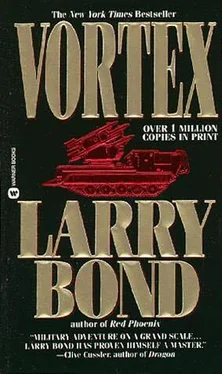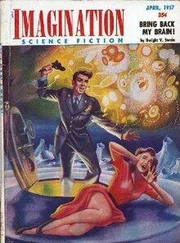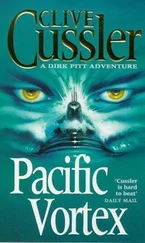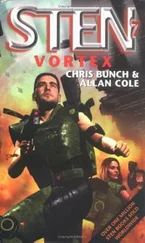At least running through standard tactics kept his mind busy while he waited for the next ranging shot. Time of flight at this range was almost a full minute-a fact that gave every potential target plenty of time to think about the next salvo between corrections.
A second shell splash appeared, this time to starboard, and closer. Malloy waited approximately twenty seconds, then ordered, “Right full rudder, steady on course one two six.”
The massive vessel actually heeled over in the hard highspeed turn and quickly steadied up on her new course. Half a minute later, a ragged line of shell bursts tore the sea apart, well off to port. Those bastards would have to work harder than that to catch him. Malloy felt as if he were in a pitchers’ duel. He looked over at Craig, who nodded in approval.
A loudspeaker mounted on the overhead carried the gunnery officer’s voice.
“Director reports we are in range, all turrets unmasked. Request permission to fire.”
Malloy pressed the intercom switch.
“Batteries released.
Nine sixteen-inch guns fired simultaneously, bellowing in a thundering crack of noise and smoke that made him think he’d unleashed a thunderstorm.
But would the lightning strike where he wanted it?
Normally a ship twenty miles away would be invisible from the bridge, hidden by atmospheric haze and the curvature of the earth. During World War II, big-gun ships Re the Wisconsin had al I carried their own spotter planes, launched from catapults, to adjust their gunfire.
The target this time, though, was Table Mountain, with a recorded elevation of 3,566 feet. Its rocky, barren cliffs rose straight up out of the sea, visible to the naked eye. Malloy watched the summit carefully through his binoculars-waiting for his shells to arrive.
Another Afrikaner salvo landed, a half dozen splashes a hundred yards behind them. Ordering their speed down to thirty-three knots, Malloy also changed course to zero three three. That should throw them off, he thought, and he continued to watch the target.
At the Wisconsin’s stern, its aft turret swiveled around, its guns now pointing forward and to starboard. The crews inside worked frantically, bringing massive shells into alignment with gun bores and ramming them home. Bags of propellant powder were carefully loaded behind each projectile. Finally, the heavy breech was closed and locked. It took over a hundred men, working in close harmony, to serve the guns of each three-gun turret.
Malloy heard “Splash” over the loudspeaker just as the upper third of the mountain disappeared-enveloped in a cloud of smoke, flame, and dust.
Cheers filled the bridge. Malloy turned round.
“Quiet down. Did you really think we couldn’t hit a mountain?” He kept his tone light, but the message was clear.
Malloy heard a Klaxon and braced for his battlewagon’s second salvo. It roared out and he hoped his guns were having an effect. Time to start thinking about a course change again.
TABLE MOUNTAIN
For the first time during the siege, Sergeant Skuller was worried. They’d endured artillery bombardments, commando raids, even attacks by aircraft.
The Mountain and its garrison had withstood all of them-sometimes with ease.
They’d never fired at a naval target, though. During peacetime, his battery had trained against target barges, but they’d been slow-moving creatures, towed in a straight line by a civilian tug. This battleship, though, maneuvered and dodged and worst of all, shot back.
And what shots! In five minutes of action, they’d received seven or
eight tooth-rattling salvos. Lieutenant Dassen reported that they were being hit by sixteen-inch shells! The Afrikaner artilleryman looked at his own gun and tried to imagine the size of such a projectile. His eyes widened when he visualized the size of the gun you’d need, and the crew you’d have to have to serve such a weapon.
Skuller shook off his speculation and concentrated on the job at hand.
At least his G-5 could fire twice as fast as those on that ship, and rate of fire counted for a lot in a gunnery duel. After all, he told himself, they only needed one or two hits.
LISS WSCONSIN
Malloy had long since ceased bracing himself for each salvo from the guns.
Keeping one arm wrapped around a bracket, he stayed close to the 21MC intercom speaker and concentrated on dodging the increasingly accurate shell bursts.
After a little more than ten minutes, they’d closed another six miles on the target, dropping the range to about thirteen and a half miles. His guns grew more accurate as the range decreased, but the enemy’s accuracy was improving as well. A shorter range meant a smaller time of flight, less dispersion in the fall of shot, and even reduced error in the range-finding equipment.
The Wisconsin’s guns fired again, and Malloy ordered another course change, this time back to a starboard “tack.” The trick was to get the ship’s rudder over and steady up quickly. The turret crews were reloading while the guns pivoted to the opposite side, and if everything went by the numbers, rate of fire wasn’t affected in the slightest.
Another line of shell bursts tore up the ocean, close aboard, just off the port side. A fraction of a second later, the water on either side of the Wisconsin vanished in tower columns of yellowish spray. The ship shook violently as a ball of black smoke and orange flame cloaked her forecastle. They’d been hit!
Malloy leaned forward, peering out through the bridge windows. He couldn’t see the damage. Even with the wind created by the battleship’s speed, the shell smoke streamed astern only slowly.
As if to reassure him, all three turrels fired on schedule, and Malloy ordered a change in speed and direction almost by reflex. When the gun smoke cleared, the site of the shell hit was visible-a small, ugly hole forward of the Wisconsin’s Number One turret, slightly to port.
It was a solid hit, and he shuddered to think of the damage their escort destroyer, the Scott, would have suffered from that impact. The
Wisconsin, though, had three armored decks. The top deck, the one penetrated, was three inches thick. A second right below the first was twice as thick. All told, nine inches of solid armor had easily stopped the force of the 155mm, exploding shell.
But not all of his ship’s vital areas were so well protected. Malloy could only hope there wouldn’t be many more like that.
TABLE MOUNTAIN
Sergeant Skuller listened to the news with incredulity. The A Gun had taken a direct hit on its gun shield. The impact had pushed the thirteen-ton artillery piece twenty meters back down the tunnel, killing its crew instantly and mixing them with their weapon in an unholy tangle of metal and flesh.
Another enemy salvo shook C Gun’s tunnel. The mountain could absorb a lot of punishment, thank God. The little bit that reached them was bad enough.
“Calling C Gun. Are you all right?” Lieutenant Dassen sounded shaken.
Skuller waited a beat as Hiller pressed the firing switch. The gun’s breech leapt backward. Even when wearing protective earphones the noise was almost deafening.
“We’re fine here, sir.”
“D Gun is out of action. A shell in that last salvo collapsed the tunnel on them.”
D Gun was right next door. Skuller’s eyes leapt to the rock ceiling above them. The rough surface was covered with air
ducts, water pipes, and electrical cables. He scanned the ceiling for any sign of damage. Nothing was visible.
Another salvo from the American battleship hammered the mountain above them. Skuller was too busy readying his gun for its next shot to notice the network of fine cracks spreading through the ceiling overhead. They’d been invisible when he looked before, more weaknesses in the rock crystal than actual cracks. But the sledgehammer pounding created more and more fractures. Every linked crack weakened the overhead rock’s ability to support its own weight.
Читать дальше












